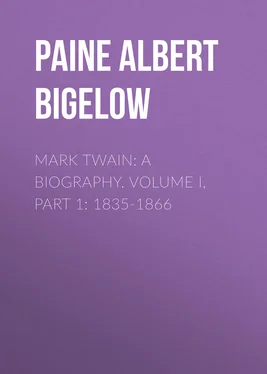Albert Paine - Mark Twain - A Biography. Volume I, Part 1 - 1835-1866
Здесь есть возможность читать онлайн «Albert Paine - Mark Twain - A Biography. Volume I, Part 1 - 1835-1866» — ознакомительный отрывок электронной книги совершенно бесплатно, а после прочтения отрывка купить полную версию. В некоторых случаях можно слушать аудио, скачать через торрент в формате fb2 и присутствует краткое содержание. Жанр: Биографии и Мемуары, foreign_antique, на английском языке. Описание произведения, (предисловие) а так же отзывы посетителей доступны на портале библиотеки ЛибКат.
- Название:Mark Twain: A Biography. Volume I, Part 1: 1835-1866
- Автор:
- Жанр:
- Год:неизвестен
- ISBN:нет данных
- Рейтинг книги:4 / 5. Голосов: 1
-
Избранное:Добавить в избранное
- Отзывы:
-
Ваша оценка:
- 80
- 1
- 2
- 3
- 4
- 5
Mark Twain: A Biography. Volume I, Part 1: 1835-1866: краткое содержание, описание и аннотация
Предлагаем к чтению аннотацию, описание, краткое содержание или предисловие (зависит от того, что написал сам автор книги «Mark Twain: A Biography. Volume I, Part 1: 1835-1866»). Если вы не нашли необходимую информацию о книге — напишите в комментариях, мы постараемся отыскать её.
Mark Twain: A Biography. Volume I, Part 1: 1835-1866 — читать онлайн ознакомительный отрывок
Ниже представлен текст книги, разбитый по страницам. Система сохранения места последней прочитанной страницы, позволяет с удобством читать онлайн бесплатно книгу «Mark Twain: A Biography. Volume I, Part 1: 1835-1866», без необходимости каждый раз заново искать на чём Вы остановились. Поставьте закладку, и сможете в любой момент перейти на страницу, на которой закончили чтение.
Интервал:
Закладка:
Albert Bigelow Paine
Mark Twain: A Biography. Volume I, Part 1: 1835-1866
AN ACKNOWLEDGMENT
Dear William Dean Howells, Joseph Hopkins Twichell, Joseph T. Goodman, and other old friends of Mark Twain:
I cannot let these volumes go to press without some grateful word to you who have helped me during the six years and more that have gone to their making.
First, I want to confess how I have envied you your association with Mark Twain in those days when you and he "went gipsying, a long time ago." Next, I want to express my wonder at your willingness to give me so unstintedly from your precious letters and memories, when it is in the nature of man to hoard such treasures, for himself and for those who follow him. And, lastly, I want to tell you that I do not envy you so much, any more, for in these chapters, one after another, through your grace, I have gone gipsying with you all. Neither do I wonder now, for I have come to know that out of your love for him grew that greater unselfishness (or divine selfishness, as he himself might have termed it), and that nothing short of the fullest you could do for his memory would have contented your hearts.
My gratitude is measureless; and it is world-wide, for there is no land so distant that it does not contain some one who has eagerly contributed to the story. Only, I seem so poorly able to put my thanks into words.
Albert Bigelow Paine.PREFATORY NOTE
Certain happenings as recorded in this work will be found to differ materially from the same incidents and episodes as set down in the writings of Mr. Clemens himself. Mark Twain's spirit was built of the very fabric of truth, so far as moral intent was concerned, but in his earlier autobiographical writings—and most of his earlier writings were autobiographical—he made no real pretense to accuracy of time, place, or circumstance—seeking, as he said, "only to tell a good story"—while in later years an ever-vivid imagination and a capricious memory made history difficult, even when, as in his so-called "Autobiography," his effort was in the direction of fact.
"When I was younger I could remember anything, whether it happened or not," he once said, quaintly, "but I am getting old, and soon I shall remember only the latter."
The reader may be assured, where discrepancies occur, that the writer of this memoir has obtained his data from direct and positive sources: letters, diaries, account-books, or other immediate memoranda; also from the concurring testimony of eye-witnesses, supported by a unity of circumstance and conditions, and not from hearsay or vagrant printed items.
MARK TWAIN
A BIOGRAPHY I
ANCESTORS
On page 492 of the old volume of Suetonius, which Mark Twain read until his very last day, there is a reference to one Flavius Clemens, a man of wide repute "for his want of energy," and in a marginal note he has written:
"I guess this is where our line starts."
It was like him to write that. It spoke in his whimsical fashion the attitude of humility, the ready acknowledgment of shortcoming, which was his chief characteristic and made him lovable—in his personality and in his work.
Historically, we need not accept this identity of the Clemens ancestry. The name itself has a kindly meaning, and was not an uncommon one in Rome. There was an early pope by that name, and it appears now and again in the annals of the Middle Ages. More lately there was a Gregory Clemens, an English landowner who became a member of Parliament under Cromwell and signed the death-warrant of Charles I. Afterward he was tried as a regicide, his estates were confiscated, and his head was exposed on a pole on the top of Westminster Hall.
Tradition says that the family of Gregory Clemens did not remain in England, but emigrated to Virginia (or New Jersey), and from them, in direct line, descended the Virginia Clemenses, including John Marshall Clemens, the father of Mark Twain. Perhaps the line could be traced, and its various steps identified, but, after all, an ancestor more or less need not matter when it is the story of a descendant that is to be written.
Of Mark Twain's immediate forebears, however, there is something to be said. His paternal grandfather, whose name also was Samuel, was a man of culture and literary taste. In 1797 he married a Virginia girl, Pamela Goggin; and of their five children John Marshall Clemens, born August 11, 1798, was the eldest—becoming male head of the family at the age of seven, when his father was accidentally killed at a house-raising. The family was not a poor one, but the boy grew up with a taste for work. As a youth he became a clerk in an iron manufactory, at Lynchburg, and doubtless studied at night. At all events, he acquired an education, but injured his health in the mean time, and somewhat later, with his mother and the younger children, removed to Adair County, Kentucky, where the widow presently married a sweetheart of her girlhood, one Simon Hancock, a good man. In due course, John Clemens was sent to Columbia, the countyseat, to study law. When the living heirs became of age he administered his father's estate, receiving as his own share three negro slaves; also a mahogany sideboard, which remains among the Clemens effects to this day.
This was in 1821. John Clemens was now a young man of twenty-three, never very robust, but with a good profession, plenty of resolution, and a heart full of hope and dreams. Sober, industrious, and unswervingly upright, it seemed certain that he must make his mark. That he was likely to be somewhat too optimistic, even visionary, was not then regarded as a misfortune.
It was two years later that he met Jane Lampton; whose mother was a Casey —a Montgomery-Casey whose father was of the Lamptons (Lambtons) of Durham, England, and who on her own account was reputed to be the handsomest girl and the wittiest, as well as the best dancer, in all Kentucky. The Montgomeries and the Caseys of Kentucky had been Indian fighters in the Daniel Boone period, and grandmother Casey, who had been Jane Montgomery, had worn moccasins in her girlhood, and once saved her life by jumping a fence and out-running a redskin pursuer. The Montgomery and Casey annals were full of blood-curdling adventures, and there is to-day a Casey County next to Adair, with a Montgomery County somewhat farther east. As for the Lamptons, there is an earldom in the English family, and there were claimants even then in the American branch. All these things were worth while in Kentucky, but it was rare Jane Lampton herself—gay, buoyant, celebrated for her beauty and her grace; able to dance all night, and all day too, for that matter—that won the heart of John Marshall Clemens, swept him off his feet almost at the moment of their meeting. Many of the characteristics that made Mark Twain famous were inherited from his mother. His sense of humor, his prompt, quaintly spoken philosophy, these were distinctly her contribution to his fame. Speaking of her in a later day, he once said:
"She had a sort of ability which is rare in man and hardly existent in woman—the ability to say a humorous thing with the perfect air of not knowing it to be humorous."
She bequeathed him this, without doubt; also her delicate complexion; her wonderful wealth of hair; her small, shapely hands and feet, and the pleasant drawling speech which gave her wit, and his, a serene and perfect setting.
It was a one-sided love affair, the brief courtship of Jane Lampton and John Marshall Clemens. All her life, Jane Clemens honored her husband, and while he lived served him loyally; but the choice of her heart had been a young physician of Lexington with whom she had quarreled, and her prompt engagement with John Clemens was a matter of temper rather than tenderness. She stipulated that the wedding take place at once, and on May 6, 1823, they were married. She was then twenty; her husband twenty-five. More than sixty years later, when John Clemens had long been dead, she took a railway journey to a city where there was an Old Settlers' Convention, because among the names of those attending she had noticed the name of the lover of her youth. She meant to humble herself to him and ask forgiveness after all the years. She arrived too late; the convention was over, and he was gone. Mark Twain once spoke of this, and added:
Читать дальшеИнтервал:
Закладка:
Похожие книги на «Mark Twain: A Biography. Volume I, Part 1: 1835-1866»
Представляем Вашему вниманию похожие книги на «Mark Twain: A Biography. Volume I, Part 1: 1835-1866» списком для выбора. Мы отобрали схожую по названию и смыслу литературу в надежде предоставить читателям больше вариантов отыскать новые, интересные, ещё непрочитанные произведения.
Обсуждение, отзывы о книге «Mark Twain: A Biography. Volume I, Part 1: 1835-1866» и просто собственные мнения читателей. Оставьте ваши комментарии, напишите, что Вы думаете о произведении, его смысле или главных героях. Укажите что конкретно понравилось, а что нет, и почему Вы так считаете.












